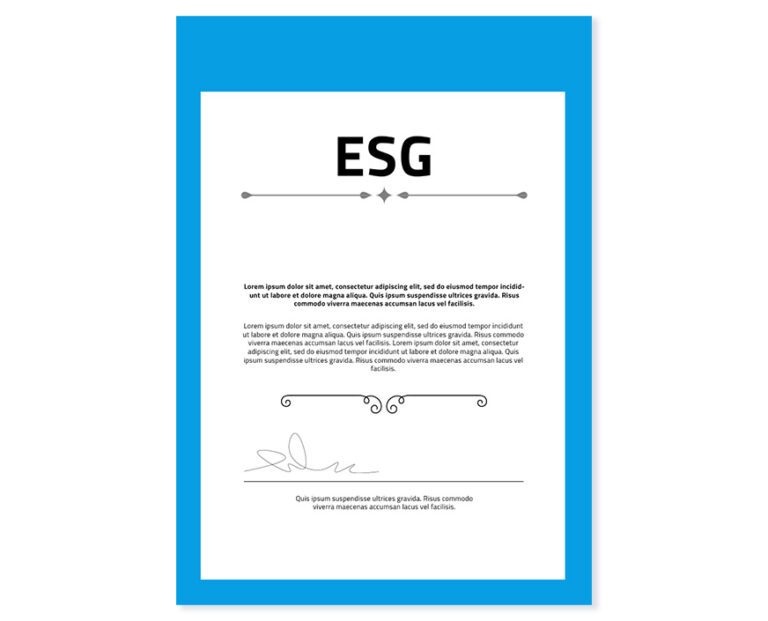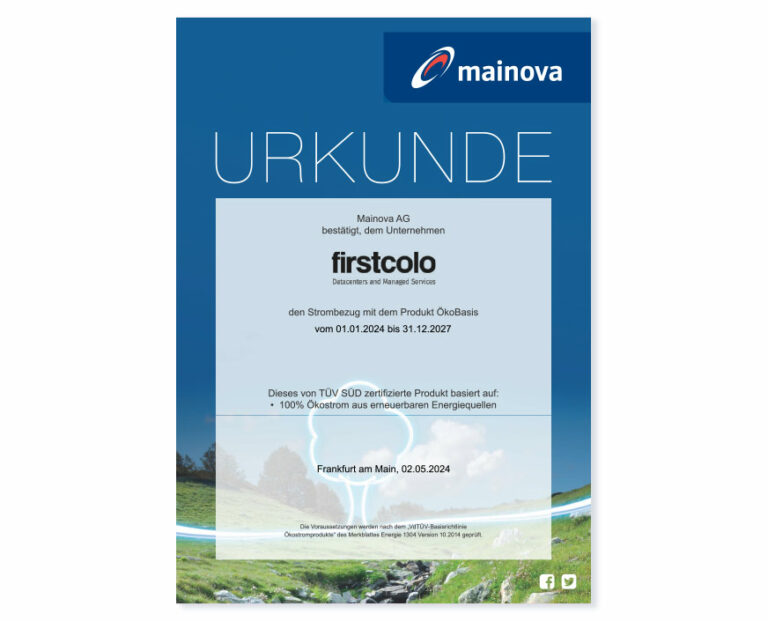Sustainability is part of our DNA
Sustainability is very important to us. We rely on 100% green electricity and state-of-the-art technologies for cooling our servers.
Focusing on sustainability
Our conscious decision to reduce emissions.
As data center developers, at firstcolo we make conscious decisions from the start to minimize emissions.
We reduce embodied carbon and work with suppliers who offer comprehensive emission reduction programs.
Through improved colocation services and technologies, we also facilitate sustainable practices for our customers.
We are proud of:
- Cold aisle containment & indirect free cooling
- A very good PUE value of up to 1.15
- 100% certified green electricity
Our responsibility and partnership for sustainability
At firstcolo, one of our major goals is to keep the CO2 footprint of our data center operations as small as possible. To get closer to this goal, we have already taken a number of key measures. Nevertheless, there is still potential for optimization.
We take responsibility for sustainable data centers.
In the energy-intensive data center business, sustainability is particularly important – we are aware of our responsibility. Therefore, despite cost pressures, we constantly try to make our operations more sustainable and thereby reduce our ecological footprint.
We specialize in sustainable business models.
Since October 2022, we have had a new investor, Cube Infrastructure Managers, who specializes in sustainable business models. Cube Infrastructure Managers supports companies in becoming leaders in sustainability by optimizing their environmental and social responsibilities.
Implementing our ESG policy
Together, we strive to master all tasks regarding a sustainable future. An important component of our activities is the adherence to and implementation of our ESG policy. This policy underlines our commitment to Environmental, Social, and Governance. We are proud to meet these standards and continuously work on improving our processes and making them more sustainable.
Our commitment

"Prima Klima" Certificate
1,000 tree donations for the opening of our data center on Hanauer Landstraße

ESG Policy
We have implemented an ESG policy that reflects our commitment to the environment, society, and transparent corporate governance. Through concrete measures and clear goals, we actively work towards a responsible future.

"ÖkoBasis" certificate
Thanks to the "ÖkoBasis" certification from Mainova AG, the operation of firstcolo data centers is guaranteed to use 100% green electricity from renewable energy sources.
Sustainability: Frequently Asked Questions
Would you like to learn more about how sustainability is lived and implemented at firstcolo?
Data centers are a challenge in terms of sustainability due to their increasing energy consumption caused by advancing digitalization. The IT capacities of German data centers have grown considerably in recent years. However, there are approaches for improvement. Through the use of efficient server hardware and modern air conditioning technologies, data centers can be operated more energy-efficiently.
Sustainable data centers are characterized by various criteria aimed at minimizing energy consumption and reducing environmental impact. A central indicator for this is the Power Usage Effectiveness (PUE) value, which measures the ratio of the total energy consumption of a data center to the energy actually used for IT equipment. A low PUE value indicates high energy efficiency. The use of renewable energies, such as green electricity from wind, solar, or hydropower, as well as the integration of on-site generation, play an important role. Waste heat utilization and heat recovery systems help to optimize overall energy use.
According to a recent Bitkom study, German data centers consumed about 15.4 billion kilowatt hours (kWh) of electricity in 2021. This significant energy demand reflects the impacts of advancing digitalization and the increasing demand for IT services. The figures highlight the necessity to implement sustainable measures to reduce energy consumption and improve energy efficiency in data centers.
A data center must be cooled to maintain the temperature of IT equipment and infrastructure at an optimal level. Servers and other IT components generate considerable heat during operation. This heat must be dissipated to avoid overheating, which can impair performance or even lead to hardware failures. However, regulating temperature is not the only relevant factor in this context – equally important is the optimal humidity for IT hardware. A properly cooled data center can operate more efficiently, as IT equipment performs better and is less prone to errors at appropriate temperatures. This can also reduce energy consumption, as well-functioning hardware requires less energy for cooling.
The highest energy consumption in data center operations lies mainly in cooling and the operation of IT hardware. Cooling of IT equipment, which must be operated continuously to maintain optimal operating temperatures, accounts for about 30-40% of total energy consumption. Servers, storage devices, and network components that run constantly to process and transmit data consume around 40-50% of the energy. UPS (Uninterruptible Power Supply) systems, which ensure continuous power supply during power outages, contribute about 10-15% to the total energy consumption. Lighting and other infrastructure such as air conditioning and ventilation systems make up the remaining 5-10% of energy consumption.
The sustainability of a data center is evaluated through various metrics and methods. Power Usage Effectiveness (PUE) measures the ratio of total energy consumption in relation to the energy consumption of IT equipment, while Carbon Usage Effectiveness (CUE) assesses the carbon footprint in relation to the energy consumption of IT equipment. Water Usage Effectiveness (WUE) considers water consumption relative to the energy uptake of IT equipment.
Additionally, the use of renewable energy is measured, with a higher proportion contributing to the reduction of the CO2 footprint. Efficiency is also evaluated through energy consumption per computing unit and through sustainability certifications such as LEED or ISO 14001. Life Cycle Assessment (LCA) provides a comprehensive evaluation of a data center's ecological footprint over its entire life cycle. These metrics enable data centers to assess and improve their sustainability.
Contact
Feel free to send us a message
